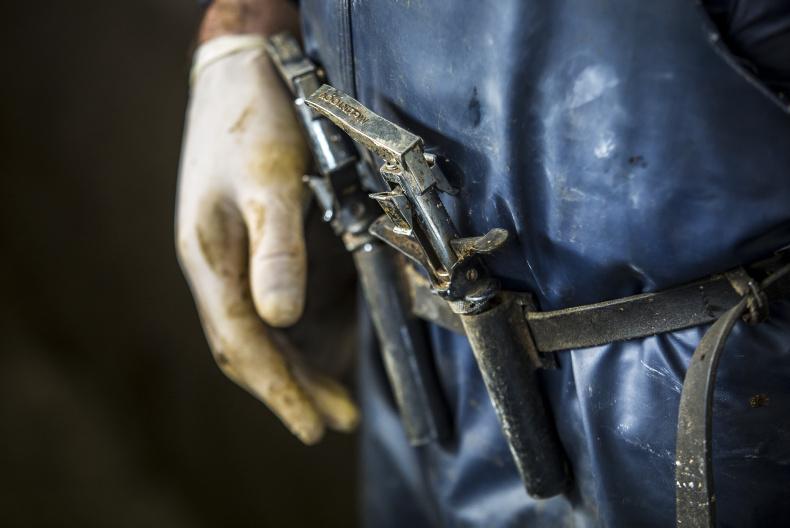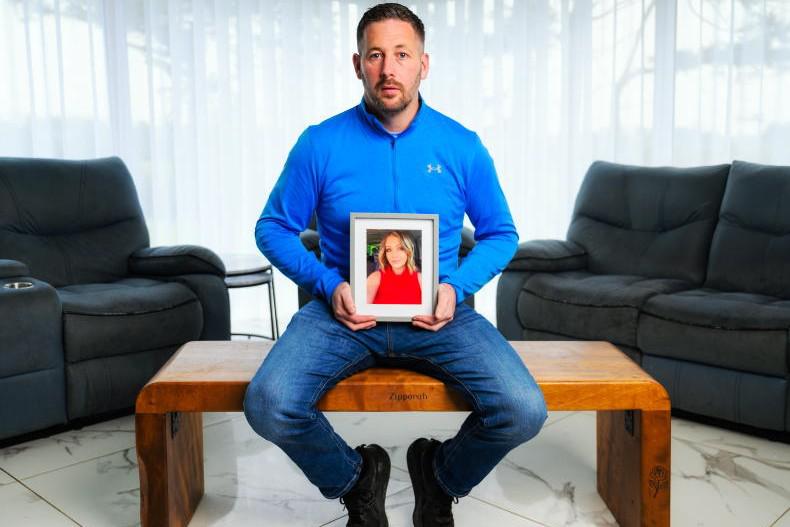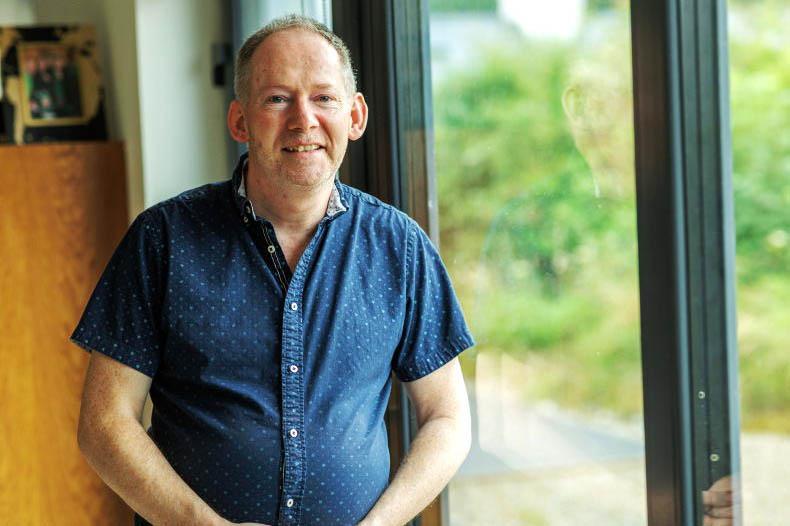Calls out in the middle of the night then straight into work the next day regardless, kicks from cows, not enough help in yards – is a vet’s lot a happy one? Or are many of them exhausted and in danger of burnout?
A survey by accounting firm HLB Sheehan Quinn carried out recently shows that almost 70% of vets cited a better work-life balance as their most important aspiration. The toxic mix of long working hours, staff shortages, rota issues and the usual business pressures of getting paid on time, were cited as factors contributing to stress and exhaustion.
“Vets are working long hours, often more than 60 a week, so it comes as no surprise that better work-life balance emerged as the top aspiration for almost 70% of the 100 vets who took part in our survey,” says Mark Butler.
High risk of accidents
Kevin McConnell is a vet with Barrack Gate Veterinary Clinic, Naas, Co Kildare. While he enjoys his work, he is very aware of the physical and emotional demands of his profession.
“The physical health stresses related to veterinary life are the high risk of injury due to kicks, bites, crushing, road traffic accidents, etc. Emotionally it’s the impact veterinary has on family life and the toll it takes on vets providing one of the few non-state subsidised 24/7 services now available.”
Being “on call” even if not actually working is a burden which, though necessary, can be draining. Overall, the job has become more stressful in recent years, Kevin believes.

Vet Kevin McConnell of Barrack Gate Veterinary Clinic, Naas.
“That’s because, in general, clients have become more demanding and their expectations are higher. Most vets endeavour to get to emergencies as soon as possible and do their best to alleviate the animal’s suffering and this (urgency) puts a lot of pressure on the on-call vet. People have become more litigious too, but thankfully the vast majority of clients really value their vets’ service.”
One-man practices are numbered
On the positive side, vets’ careers have improved in some ways – particularly where practices have gotten bigger, with more vets to share the load and the rosters.
“This means that even though you may be busy when on-call, you are not on-call as often. The days of the one-man practice are numbered, I think. Younger vets are not attracted to smaller practices as much if it means taking part in a busier roster.”
He has seen the plus and minus of change on farms too in recent years.
In small animal it has become easier, with shared rotas between practices or dedicated out-of-hours hospitals becoming more commonplace
“In general facilities on farms have improved markedly, but the downside is a serious drop in the amount of help available on most farms nowadays.”
Kevin would estimate that most vets fail to achieve a good work-life-family balance, especially in large animal practices.
“In small animal it has become easier, with shared rotas between practices or dedicated out-of-hours hospitals becoming more commonplace,” he says. “It’s harder in farm practices to achieve balance, especially at the busy times of the year, but it is something that’s slowly improving and hopefully will continue to do so.”
Vets could make the situation better and reduce stress by working together, he believes.
“We can improve things by sharing on-call between smaller practices and by practices getting bigger – therefore spreading the on-call work over more vets.”
Suicide levels a serious concern
The level of mental health issues and suicide within the veterinary profession is a major worry for the sector.
“A recent survey in the UK showed what we had long suspected – that the level of mental health issues and suicide among vets far exceeds the average (incidence of suicide is four times higher than in other occupations), which is of serious concern to the profession.
The trend to bigger practices should help, but it will always be a stressful job when you’re dealing with life and death
“It has become harder to operate as a vet over the years, with increased business and veterinary regulation making it more difficult to practice. The trend to bigger practices should help, but it will always be a stressful job when you’re dealing with life and death. It’s part of the job, however, and most of us still enjoy it.”
Mark Sheehan of HLB Sheehan Quinn took on the task of a survey of vets because there was a dearth of information about the sector.
“In Ireland there was very limited information available for vets, clients and potential clients as to what was happening in their own sector, so we tried to get an overview of the challenges and how vets respond to them.”
Part of the work-life balance challenge for practices is because unlike in the past, there aren’t as many vets willing to work very long hours.
More female vets
“It’s because of the change in demographic and who the new vets are. More than 70% of vets qualifying now are female. In the past, particularly rural vets would work a 70 or 80-hour week and be on call 24 hours. It is a big challenge now to find people to continue providing that service. Vets are not queuing up to do this any more, so we would see that the sector needs to change.”
This can be a problem for rural practices particularly, Mark states.
“It can be challenging to facilitate a reasonable work-life balance, but some practices have started to be more innovative around the type of roles they offer and have more flexible working arrangements, and this is helping. The biggest challenges are around 24-hour cover and weekend work.”
In his opinion, to avoid stress and burnout, vets need to be more open to sharing rosters between rival practices.
“Most are small businesses and most don’t like doing that. They don’t share so that leads to burnout and stress. We all know the farming community is under stress and if they are stressed or feeling challenged it means that the vets are challenged. Credit control is a major issue in the veterinary sector. Vets are so busy that they are not managing the administration side of their businesses properly, leaving collecting money too late. It can sometimes take 12 months or more for the money to come through. The vet has to turn up when called. If he doesn’t the farmer may get another vet, then it’ll take him that much longer to get paid.”
There is a perception that vets’ salaries are high, but the opposite is the case, says Mark.
“It costs more to get a locksmith out at night than it does a vet. Pay levels are not high.”
Many young vets go abroad and may come back in time bringing experience with them, but many don’t come back because of the challenges in the sector in Ireland
He points out that vets are all highly educated and enter the profession because they are caring individuals with a passion, and perhaps a vocation for animal care.
Paying back college loans can lead to young vets going abroad, however. He tells of how one vet said he had no choice but go to the US in order to repay his education debt.
“Many young vets go abroad and may come back in time bringing experience with them, but many don’t come back because of the challenges in the sector in Ireland.
“In our opinion, as an accounts advisory and tax firm, smaller rural veterinary practices will need to change to be able to offer these more flexible working conditions. It will require a mindset change for vets to change their business model.”
They have to be open also to staff participating in Continuous Professional Education (CPE) and to making a succession plan sooner rather than later, Mark believes.
“A younger vet would say the plan was I was going to take this practice over, but now he is in his 40s and he still doesn’t have a plan in sight about when he will become the owner or part-owner. This (reluctance to plan) can take the value out of the practice that was originally there. Stress in the industry can be caused by all these factors.”
There is help available for vets and veterinary nurses who are under stress. They can contact the free support service run by the Irish Veterinary Benevolent Fund via its Veterinary Assistance Programme. Dependent family members over 16 years of age can also make contact.
By ringing the freephone counselling helpline number – 1800-995955 (24 hours a day, all year) – you can avail of:
Immediate telephone counselling.Organise face-to-face counselling services – six free sessions available.Well-Net – website information on well-being, working and management issues.Email – arrange to contact a counsellor.Live Connect – contact a counsellor – facility for live email dialogue.Avail of a specialist information service – 8am to 10pm Monday to Friday; and 9am to 5pm at weekends – direct access to specialists supported by a network of solicitors and accountants. Web link www.VetAP.ie.The service is funded by the Irish Veterinary Benevolent Fund and the National Organisation for Suicide Prevention.
Calls out in the middle of the night then straight into work the next day regardless, kicks from cows, not enough help in yards – is a vet’s lot a happy one? Or are many of them exhausted and in danger of burnout?
A survey by accounting firm HLB Sheehan Quinn carried out recently shows that almost 70% of vets cited a better work-life balance as their most important aspiration. The toxic mix of long working hours, staff shortages, rota issues and the usual business pressures of getting paid on time, were cited as factors contributing to stress and exhaustion.
“Vets are working long hours, often more than 60 a week, so it comes as no surprise that better work-life balance emerged as the top aspiration for almost 70% of the 100 vets who took part in our survey,” says Mark Butler.
High risk of accidents
Kevin McConnell is a vet with Barrack Gate Veterinary Clinic, Naas, Co Kildare. While he enjoys his work, he is very aware of the physical and emotional demands of his profession.
“The physical health stresses related to veterinary life are the high risk of injury due to kicks, bites, crushing, road traffic accidents, etc. Emotionally it’s the impact veterinary has on family life and the toll it takes on vets providing one of the few non-state subsidised 24/7 services now available.”
Being “on call” even if not actually working is a burden which, though necessary, can be draining. Overall, the job has become more stressful in recent years, Kevin believes.

Vet Kevin McConnell of Barrack Gate Veterinary Clinic, Naas.
“That’s because, in general, clients have become more demanding and their expectations are higher. Most vets endeavour to get to emergencies as soon as possible and do their best to alleviate the animal’s suffering and this (urgency) puts a lot of pressure on the on-call vet. People have become more litigious too, but thankfully the vast majority of clients really value their vets’ service.”
One-man practices are numbered
On the positive side, vets’ careers have improved in some ways – particularly where practices have gotten bigger, with more vets to share the load and the rosters.
“This means that even though you may be busy when on-call, you are not on-call as often. The days of the one-man practice are numbered, I think. Younger vets are not attracted to smaller practices as much if it means taking part in a busier roster.”
He has seen the plus and minus of change on farms too in recent years.
In small animal it has become easier, with shared rotas between practices or dedicated out-of-hours hospitals becoming more commonplace
“In general facilities on farms have improved markedly, but the downside is a serious drop in the amount of help available on most farms nowadays.”
Kevin would estimate that most vets fail to achieve a good work-life-family balance, especially in large animal practices.
“In small animal it has become easier, with shared rotas between practices or dedicated out-of-hours hospitals becoming more commonplace,” he says. “It’s harder in farm practices to achieve balance, especially at the busy times of the year, but it is something that’s slowly improving and hopefully will continue to do so.”
Vets could make the situation better and reduce stress by working together, he believes.
“We can improve things by sharing on-call between smaller practices and by practices getting bigger – therefore spreading the on-call work over more vets.”
Suicide levels a serious concern
The level of mental health issues and suicide within the veterinary profession is a major worry for the sector.
“A recent survey in the UK showed what we had long suspected – that the level of mental health issues and suicide among vets far exceeds the average (incidence of suicide is four times higher than in other occupations), which is of serious concern to the profession.
The trend to bigger practices should help, but it will always be a stressful job when you’re dealing with life and death
“It has become harder to operate as a vet over the years, with increased business and veterinary regulation making it more difficult to practice. The trend to bigger practices should help, but it will always be a stressful job when you’re dealing with life and death. It’s part of the job, however, and most of us still enjoy it.”
Mark Sheehan of HLB Sheehan Quinn took on the task of a survey of vets because there was a dearth of information about the sector.
“In Ireland there was very limited information available for vets, clients and potential clients as to what was happening in their own sector, so we tried to get an overview of the challenges and how vets respond to them.”
Part of the work-life balance challenge for practices is because unlike in the past, there aren’t as many vets willing to work very long hours.
More female vets
“It’s because of the change in demographic and who the new vets are. More than 70% of vets qualifying now are female. In the past, particularly rural vets would work a 70 or 80-hour week and be on call 24 hours. It is a big challenge now to find people to continue providing that service. Vets are not queuing up to do this any more, so we would see that the sector needs to change.”
This can be a problem for rural practices particularly, Mark states.
“It can be challenging to facilitate a reasonable work-life balance, but some practices have started to be more innovative around the type of roles they offer and have more flexible working arrangements, and this is helping. The biggest challenges are around 24-hour cover and weekend work.”
In his opinion, to avoid stress and burnout, vets need to be more open to sharing rosters between rival practices.
“Most are small businesses and most don’t like doing that. They don’t share so that leads to burnout and stress. We all know the farming community is under stress and if they are stressed or feeling challenged it means that the vets are challenged. Credit control is a major issue in the veterinary sector. Vets are so busy that they are not managing the administration side of their businesses properly, leaving collecting money too late. It can sometimes take 12 months or more for the money to come through. The vet has to turn up when called. If he doesn’t the farmer may get another vet, then it’ll take him that much longer to get paid.”
There is a perception that vets’ salaries are high, but the opposite is the case, says Mark.
“It costs more to get a locksmith out at night than it does a vet. Pay levels are not high.”
Many young vets go abroad and may come back in time bringing experience with them, but many don’t come back because of the challenges in the sector in Ireland
He points out that vets are all highly educated and enter the profession because they are caring individuals with a passion, and perhaps a vocation for animal care.
Paying back college loans can lead to young vets going abroad, however. He tells of how one vet said he had no choice but go to the US in order to repay his education debt.
“Many young vets go abroad and may come back in time bringing experience with them, but many don’t come back because of the challenges in the sector in Ireland.
“In our opinion, as an accounts advisory and tax firm, smaller rural veterinary practices will need to change to be able to offer these more flexible working conditions. It will require a mindset change for vets to change their business model.”
They have to be open also to staff participating in Continuous Professional Education (CPE) and to making a succession plan sooner rather than later, Mark believes.
“A younger vet would say the plan was I was going to take this practice over, but now he is in his 40s and he still doesn’t have a plan in sight about when he will become the owner or part-owner. This (reluctance to plan) can take the value out of the practice that was originally there. Stress in the industry can be caused by all these factors.”
There is help available for vets and veterinary nurses who are under stress. They can contact the free support service run by the Irish Veterinary Benevolent Fund via its Veterinary Assistance Programme. Dependent family members over 16 years of age can also make contact.
By ringing the freephone counselling helpline number – 1800-995955 (24 hours a day, all year) – you can avail of:
Immediate telephone counselling.Organise face-to-face counselling services – six free sessions available.Well-Net – website information on well-being, working and management issues.Email – arrange to contact a counsellor.Live Connect – contact a counsellor – facility for live email dialogue.Avail of a specialist information service – 8am to 10pm Monday to Friday; and 9am to 5pm at weekends – direct access to specialists supported by a network of solicitors and accountants. Web link www.VetAP.ie.The service is funded by the Irish Veterinary Benevolent Fund and the National Organisation for Suicide Prevention.










SHARING OPTIONS